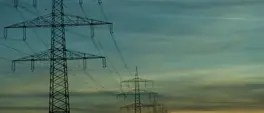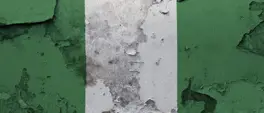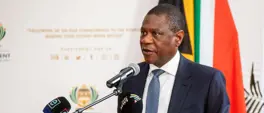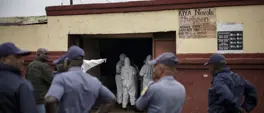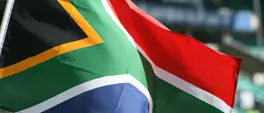YONELA DIKO: Ramaphosa must be commended for rebuilding State institutions
Yonela Diko
23 September 2024 | 7:00President Cyril Ramaphosa establishing public enquiries to unearth the rot flourishing underneath State institutions was a stroke of genius, the results of which are satisfactory, writes Yonela Diko.
After a decade of wreaking havoc as the Lord over the State, and two torturous weeks obfuscating and stalling and refusing to leave office, Jacob Zuma finally relented and publicly resigned as President of South Africa in early 2018.
The attention immediately shifted to the new president, and the insurmountable task of rebuilding a hollowed State that laid before him.
How was Ramaphosa going to effect the necessary rebuilding of the State with Zuma enablers and aiders still at the helm of all the critical institutions?
The people expected Ramaphosa to be bold and decisive. The country needed him to show courage for the sake of our young democracy. The Zuma apparatchiks were still in charge.
The Hawks, the South African Police Service (SAPS), South African Revenue Services (SARS), and the National Prosecuting Authority (NPA), among others, were not in a position to assist the president in conducting any credible and legitimate work until they were cleaned. There was no telling how deep the rabbit hole went, and it was pointless to hope to effect any accountability through these institutions until they were made whole again.
Ramaphosa decided to embark on establishing a few public enquiries headed by trusted and retired jurists to unearth the rot swimming underneath these institutions, and at the very least, be able to have legal ammunition to fire some people if these retired jurists were to recommend for such steps to be taken.
This proved to be a stroke of genius.
After taking time to take stock of the state of government he was inheriting, Ramaphosa decided first to appoint retired Constitutional Court Justice Yvonne Mokgoro to set up an enquiry into the fitness to hold office of two senior prosecutors prone to scandal - Nomgcobo Jiba and Lawrence Mrwebi - who had been the face of everything that was wrong at the NPA.
It was important that before any new appointments were made in the NPA, the rot is uprooted and cleaned out. Without removing these two, especially Jiba, any new Head would be frustrated out of office, as Mxolisi Nxasana learnt the hard way.
In six months, Jiba and Mrwebi were fired as recommended by Judge Mokgoro. A process to appoint a new NPA boss was underway and in an open and public process, Shamila Batohi emerged as the best candidate to lead the NPA out of the clutches of the Zuma cabal.
The next institution that was up for deep cleansing was SARS. To tackle the deep-seated problems, Ramaphosa called on former judge Robert Nugent to institute an enquiry into the institution.
The head of SARS at the time was one Tom Moyane, a Zuma lackey and loyalist who had almost run the institution into the ground, failing to collect R50 billion while caught up in side shows and chasing shadows.
Instead of deepening the efficiency of the institution, Moyane was busy with conspiracy, obsessed with Zuma influenced battles against the so-called Rogue Unit within SARS during his predecessor’s term, Pravin Gordan, which was apparently protecting certain favoured tax payers from consequence.
Nugent made recommendations to Ramaphosa, and Moyane was shown the door. In came the clean-cut looking tax specialist Edward Kieswietter, who immediately brought stability to the institution and restored the pride of the nation this institution had enjoyed for so long before Moyane.
Ramaphosa's march towards a cleaner and more effective government was just getting started.
The next institution was state security. This time, Ramaphosa appointed former police minister under President Thabo Mbeki, Sydney Mufamadi, to look into how the spy institution had become politicised over time.
The report dropped like a bomb when it was released, with its unlimited resources used to spy on public and private people along African National Congress (ANC) factional and political lines.
The same thing happened with Justice Lex Mpati’s enquiry into the Public Investment Corporation (PIC). Once that report was done, heads started rolling as per the judge’s recommendation.
The most important commission, the State Capture Commission, aptly referred to as the “Zondo Commission”, was vital to establish whether certain individuals, companies and interests had effectively captured the State for it to be turned into an executive branch of corrupt interests.
After two years, hundreds of witnesses and thousands of pages, over 200 names were identified as having cases to answer. One by one, senior government officials and politicians found themselves behind the dock.
These enquiries served to show how deep the Zuma damage into State institutions went. Now that the rot was out, the ball was back in Ramaphosa’s court. What was he going to do? The country needed real consequence, and there was nothing more symbolic than seeing former ministers in orange overalls paying for their sins.
The purpose of cleaning up the institutions and beginning the work of rebuilding them was so that these institutions can deal with all the rot and corruption that came out of the inquiries themselves.
The work of persecuting all the perpetrators has been slow but steady.
Those who wanted consequences immediately found the president not bold enough. Those who wanted Ramaphosa to keep the institutions weak to protect them from their own iniquities have found Ramaphosa having gone too far in opening them up to scrutiny.
After many years of the corrupt finding refuge at the highest office in the land, the current developments are satisfying to us as citizens.
Yonela Diko is the former spokesperson for the Minister of Human Settlements, Water and Sanitation.
Get the whole picture 💡
Take a look at the topic timeline for all related articles.
